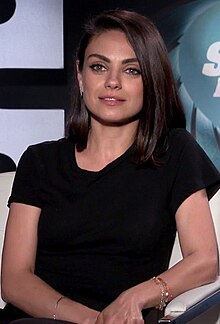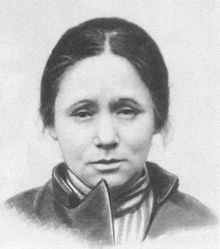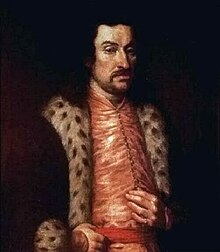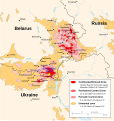Portal:Ukraine
The Ukraine Portal - Портал України
Ukraine Україна (Ukrainian) | |
|---|---|
| ISO 3166 code | UA |
Ukraine is a country in Eastern Europe. It is the second-largest European country after Russia, which borders it to the east and northeast. Ukraine also borders Belarus to the north; Poland and Slovakia to the west; Hungary, Romania and Moldova to the southwest; and the Black Sea and the Sea of Azov to the south and southeast. Kyiv is the nation's capital and largest city, followed by Kharkiv, Dnipro, and Odesa. Ukraine's official language is Ukrainian.
Humans have inhabited Ukraine since 32,000 BC. During the Middle Ages, it was the site of early Slavic expansion and later became a key centre of East Slavic culture under the state of Kievan Rus', which emerged in the 9th century. Kievan Rus' became the largest and most powerful realm in Europe in the 10th and 11th centuries, but gradually disintegrated into rival regional powers before being destroyed by the Mongols in the 13th century. The area was then contested, divided, and ruled by a variety of external powers for the next 600 years, including the Grand Duchy of Lithuania, Polish–Lithuanian Commonwealth, the Austrian Empire, the Ottoman Empire, and the Tsardom of Russia.
The Cossack Hetmanate emerged in central Ukraine in the 17th century but was partitioned between Russia and Poland before being absorbed by the Russian Empire in the late 19th century. Ukrainian nationalism developed and, following the Russian Revolution in 1917, the short-lived Ukrainian People's Republic was formed. The Bolsheviks consolidated control over much of the former empire and established the Ukrainian Soviet Socialist Republic, which became a constituent republic of the Soviet Union in 1922. In the early 1930s, millions of Ukrainians died in the Holodomor, a human-made famine. During World War II, Ukraine was occupied by Germany and endured major battles and atrocities, resulting in 7 million civilians killed, including most Ukrainian Jews.
Ukraine gained independence in 1991 as the Soviet Union dissolved and declared itself neutral. A new constitution was adopted in 1996 as the country transitioned to a free market liberal democracy amid endemic corruption and a legacy of state control. The Orange Revolution of 2004–2005 ushered electoral and constitutional reforms. Resurgent political crises prompted a series of mass demonstrations in 2014 known as the Euromaidan, leading to a revolution, at the end of which Russia unilaterally occupied and annexed Ukraine's Crimean Peninsula, and pro-Russian unrest culminated in a war in Donbas with Russian-backed separatists and Russia. Russia launched a full-scale invasion of Ukraine in 2022. (Full article...)
In the news
- 26 January 2025 – Russian invasion of Ukraine
- Velyka Novosilka offensive
- The Russian Ministry of Defence claims that Russian forces have captured the village of Velyka Novosilka, Donetsk Oblast. (Mathrubhumi)
- 24 January 2025 – Russian invasion of Ukraine
- Attacks in Russia during the Russian invasion of Ukraine
- A Ukrainian drone strike targets an oil refinery in Ryazan Oblast, Russia, in one of the largest Ukrainian drone attacks inside Russia of the conflict to date. The Russian military says it shot down at least 121 drones over 13 regions overnight. (BBC News)
- Kyiv strikes
- A Russian drone strikes a ten-storey apartment building in Fastiv, Kyiv Oblast, killing at least three people. (Euronews)
- Mobilization in Ukraine
- Ukraine finalizes military reforms aimed at recruiting 18- to 25-year-olds to the armed forces, penalizing draft dodgers, and lowering the minimum compulsory military service age to 25 from 27. (The Kyiv Independent)
- The Ukrainian Coordination Headquarters for the Treatment of Prisoners of War announces that, with assistance from the International Committee of the Red Cross, the bodies of 757 Ukrainian soldiers have been returned to Ukraine. (The Kyiv Independent)
- 24 January 2025 – 2025 Slovak protests
- Over 60,000 people demonstrate across Slovakia in protest of Prime Minister Robert Fico's anti-Ukrainian, pro-Russian, and Eurosceptic policies. (AP)
Featured pictures
Did you know (auto-generated)

- ... that some severe environmental impacts of the invasion of Ukraine can be seen from space?
- ... that during a German charity concert for Ukraine, Slovakian singer Judita Nagyová performed a solo in the finale of Beethoven's Ninth Symphony?
- ... that the United Ukrainian Ballet Company, consisting of exiled dancers based in The Hague, has toured the UK, Singapore, Australia and the US?
- ... that Hanna Dmyterko was among 34 Ukrainian women who fought in World War I?
- ... that Volodymyr Kozhukhar, the chief conductor of the National Opera of Ukraine in Kyiv, led Lysenko's opera Taras Bulba and Shchedrin's ballet Carmen Suite?
- ... that J. T. Blatty was a tennis star and US Army captain before photographing military volunteers in Ukraine?
More did you know -
- ... that journalist Savik Shuster who used to work for Russian TV channels now prefers to work for the Ukrainian TV because he felt the Russian Government was limiting his journalistic freedom?
- ... that the Privat Group is one of the few Ukrainian companies that own industries in the United States?
- ... that the married Western Ukrainian Clergy became a hereditary caste that dominated western Ukrainian society?
- ... that Ukrainian naturalist, lecturer, artist and author John Lhotsky was credited as the first discoverer of gold in New South Wales?
- ... that Ukrainian composer Mykola Leontovych (pictured), known for the "Carol of the Bells", was nicknamed "Ukrainian Bach" in France?
- ... that the Khreschatyk is the main street of Ukrainian capital Kyiv on which Orange Revolution and other historical events mainly took place?
Selected article -

The Cossacks are a predominantly East Slavic Eastern Christian people originating in the Pontic–Caspian steppe of eastern Ukraine and southern Russia. Historically, they were a semi-nomadic and semi-militarized people, who, while under the nominal suzerainty of various Eastern European states at the time, were allowed a great degree of self-governance in exchange for military service. Although numerous linguistic and religious groups came together to form the Cossacks, most of them coalesced and became East Slavic–speaking Orthodox Christians.
The rulers of the Polish–Lithuanian Commonwealth and Russian Empire endowed Cossacks with certain special privileges in return for the military duty to serve in the irregular troops: Zaporozhian Cossacks were mostly infantry soldiers, using war wagons, while Don Cossacks were mostly cavalry soldiers. The various Cossack groups were organized along military lines, with large autonomous groups called hosts. Each host had a territory consisting of affiliated villages called stanitsas. (Full article...)
In the news
- 26 January 2025 – Russian invasion of Ukraine
- Velyka Novosilka offensive
- The Russian Ministry of Defence claims that Russian forces have captured the village of Velyka Novosilka, Donetsk Oblast. (Mathrubhumi)
- 24 January 2025 – Russian invasion of Ukraine
- Attacks in Russia during the Russian invasion of Ukraine
- A Ukrainian drone strike targets an oil refinery in Ryazan Oblast, Russia, in one of the largest Ukrainian drone attacks inside Russia of the conflict to date. The Russian military says it shot down at least 121 drones over 13 regions overnight. (BBC News)
- Kyiv strikes
- A Russian drone strikes a ten-storey apartment building in Fastiv, Kyiv Oblast, killing at least three people. (Euronews)
- Mobilization in Ukraine
- Ukraine finalizes military reforms aimed at recruiting 18- to 25-year-olds to the armed forces, penalizing draft dodgers, and lowering the minimum compulsory military service age to 25 from 27. (The Kyiv Independent)
- The Ukrainian Coordination Headquarters for the Treatment of Prisoners of War announces that, with assistance from the International Committee of the Red Cross, the bodies of 757 Ukrainian soldiers have been returned to Ukraine. (The Kyiv Independent)
- 24 January 2025 – 2025 Slovak protests
- Over 60,000 people demonstrate across Slovakia in protest of Prime Minister Robert Fico's anti-Ukrainian, pro-Russian, and Eurosceptic policies. (AP)
Selected anniversaries for January

- January 3, 1681 — Treaty of Bakhchisarai was signed by Russia, the Ottoman Empire, and the Crimean Khanate at the conclusion of the Russo-Turkish War (1676–1681).
- January 10, 1992 — the Ukrainian karbovanets replaced the Soviet ruble at par, with the ISO 4217 code being
UAK. - January 15, 1967 — David Burliuk, an avant-garde artist, died in Long Island, New York.
- January 22, 1919 — The Act Zluky was signed, unifying the Ukrainian People's Republic and the West Ukrainian National Republic.
- January 23, 2005 — Ukrainian president Viktor Yushchenko was inaugurated into office after winning the second run-off elections in late 2004.
- January 29, 1918 — Battle of Kruty takes place between the Ukrainian People's Republic and Bolshevik forces.
Photo gallery
Related portals
Religions in Ukraine
Post Soviet states
Other countries
WikiProjects and collaborations
Associated Wikimedia
The following Wikimedia Foundation sister projects provide more on this subject:
-
Commons
Free media repository -
Wikibooks
Free textbooks and manuals -
Wikidata
Free knowledge base -
Wikinews
Free-content news -
Wikiquote
Collection of quotations -
Wikisource
Free-content library -
Wikiversity
Free learning tools -
Wikivoyage
Free travel guide -
Wiktionary
Dictionary and thesaurus
New articles
Ukrainian editions of Wikimedia projects
































































